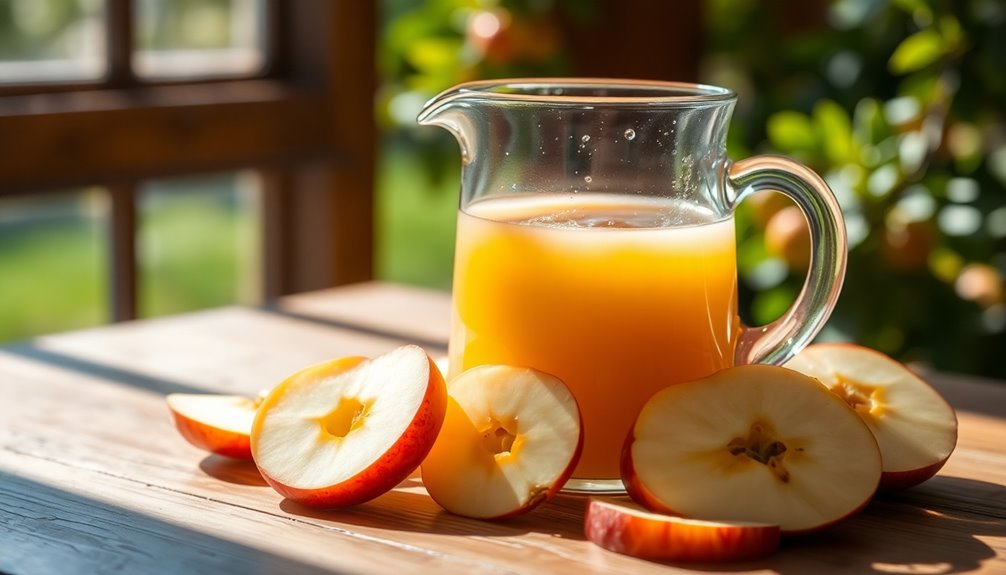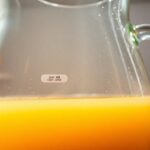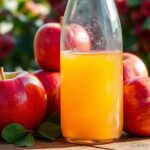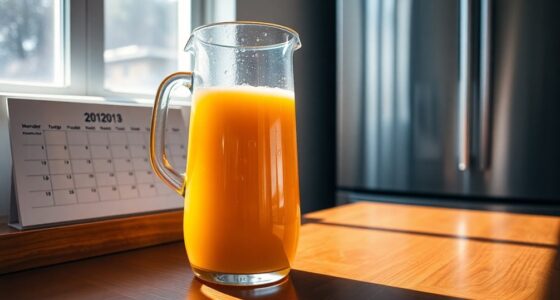Fresh apple juice lasts about 2 to 3 days in the refrigerator, so it's best to drink it soon after pressing or buying it. Without preservatives, it ferments quickly, losing its fresh flavor and developing a fizzy texture. If you want to extend its shelf life, consider freezing it, which can last up to eight months. There's more to learn about storing and preserving your juice effectively, so keep going to discover more tips!
Key Takeaways
- Fresh apple juice lasts about 2 to 3 days in the refrigerator without preservatives.
- Freezing fresh apple juice extends its shelf life up to eight months.
- Store-bought apple juice, once opened, lasts about 10 days in the refrigerator.
- Pasteurized apple juice can last 1 to 2 years when stored correctly.
- Always monitor for signs of fermentation or spoilage in fresh juice.
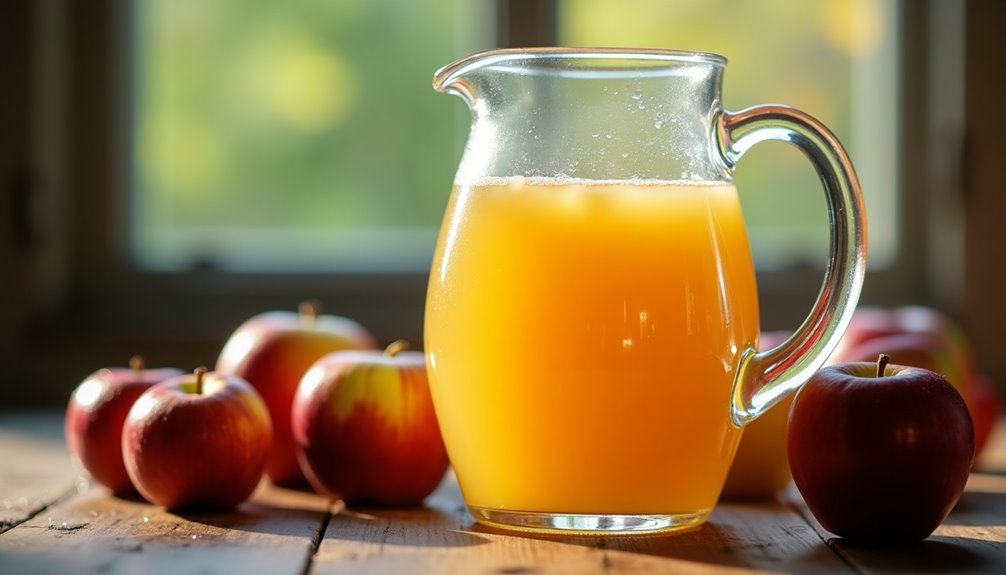
Have you ever wondered how long fresh apple juice really lasts? If you've pressed your own apples or bought some from a local orchard, you might be excited about that delicious, fresh taste. However, it's essential to know how long you can enjoy it before it starts to spoil.
Fresh apple juice typically lasts only about 2 to 3 days in the refrigerator. That's because, unlike store-bought varieties, homemade juice doesn't contain preservatives, which means it can ferment quickly. Once fermentation begins, the juice will lose its fresh flavor and might even develop a fizzy texture that's not exactly what you want.
If you've got a batch of fresh apple juice that you can't drink right away, don't worry! You can extend its shelf life by freezing it. Frozen apple juice can last up to eight months, but for the best taste, you should aim to consume it within three to four months. Freezing is a great way to preserve that fresh flavor. Just pour the juice into an airtight container, leaving a little space at the top for expansion, and pop it in the freezer. When you're ready to enjoy it, simply thaw it in the fridge, and you'll have a refreshing drink that reminds you of those fresh apples.
Now, let's talk about store-bought apple juice. Opened bottles of store-bought juice have a longer shelf life compared to fresh juice. Once you've opened a bottle, you can typically store it in the fridge for about 10 days. If you're dealing with canned juice, it's best to finish it within a week after opening.
While it may be tempting to keep it around longer, the quality can diminish and may not taste as good after that period. The preservatives used in store-bought apple juice do help it last longer than homemade varieties, but even they've their limits.
If you're looking for a way to make your apple juice last even longer, pasteurization is an option. Pasteurized apple juice can extend its shelf life significantly, lasting up to 1 to 2 years when stored in sterilized, airtight containers.
This process involves heating the juice to kill off any bacteria and enzymes that lead to spoilage. So, if you're planning to make a large batch, consider pasteurizing it for a longer-lasting treat.
Frequently Asked Questions
How Long Does Fresh Squeezed Apple Juice Last in the Fridge?
When you store freshly squeezed apple juice in the fridge, it should last about 2-3 days before it starts to ferment.
To keep it fresh, use airtight containers and make sure your fridge stays below 40°F (4°C).
If you can't drink it within that time, consider freezing it, which can preserve flavor for months.
Always check for any sour smell, cloudiness, or mold before enjoying your juice.
How to Preserve Fresh Apple Juice?
To preserve fresh apple juice, you've got options.
Think about freezing it in airtight containers for long-lasting flavor versus drinking it fresh.
You can also pasteurize the juice, heating it briefly to extend its shelf life, or can it in sterilized jars for a year of freshness.
If you prefer something unique, try dehydrating the juice into a concentrate—easy to rehydrate later.
Choose the method that best fits your needs and enjoy!
How Long Can You Keep Juice After Juicing?
Once you've juiced your apples, you can usually keep the juice in the fridge for about 2-3 days before it starts to ferment.
If you seal it tightly in an airtight container, it might last up to a week.
For longer storage, consider freezing it; that way, you can enjoy it for several months.
Just remember to check for any signs of spoilage before drinking, like sour smells or cloudiness.
Can You Drink Apple Juice After 7 Days?
Imagine biting into a crisp, juicy apple—refreshing and vibrant.
Now, think about that same apple left out for a week. Can you still enjoy it?
When it comes to apple juice, the answer's similar. After 7 days in the fridge, it's risky to drink.
You might smell something off or see cloudiness. If you notice those signs, it's best to toss it.
Stay safe and savor your juice within a few days!
Conclusion
In a nutshell, fresh apple juice doesn't last as long as you might think. When stored in the fridge, it's best consumed within 3 to 5 days for optimal flavor and freshness. If you want it to stick around a bit longer, consider freezing it. Remember, though, time waits for no one, and the fresher the juice, the better the taste. So, enjoy that delicious nectar while you can!
Cindy thoroughly researches juicing trends, techniques, and recipes to provide readers with practical advice and inspiration. Her writing style is accessible, engaging, and designed to make complex concepts easy to understand. Cindy’s dedication to promoting the advantages of juicing shines through her work, empowering readers to make positive changes in their lives through the simple act of juicing.

